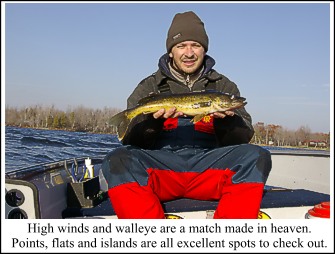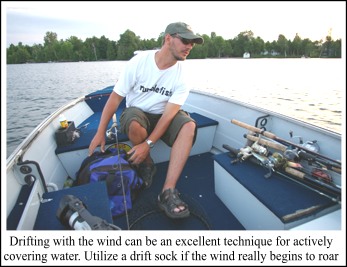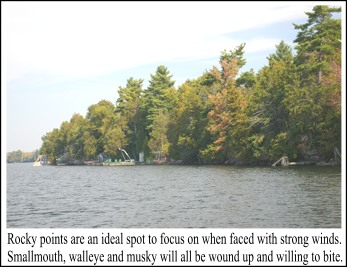
Click Here
|
 "Fishing
and the Wind" "Fishing
and the Wind"
By Justin Hoffman
Put up your
hand if you enjoy fishing in the wind? Hmm, not much of a response
there. This comes as no surprise, as for the most part, anglers the
world over absolutely abhor fishing in the wind. What other
condition accounts for out-of-control drifts, crashing waves, bird
nest lines and energy sapping chaos?
If truth were
known, the wind can be your friend out there, leading you to big
fish and enjoyable days. Here's how to use the windy stuff to your
advantage.
Overcome
Your Fear
Before you can begin to use the wind to your advantage, you first
must come to accept it. If you choose not to fish during a windy
day, that's one less day you'll get to spend on the water this
season, and that is a mistake. Don't get me wrong - if you are
facing gale force winds, and safety is of a prime concern, please
leave the boat on the trailer. But if it is "everyday" wind we are
talking about, get yourself out there and enjoy it.
Up until a few
years ago I would cancel a fishing trip based solely on the wind. If
I did head out and the wind began to blow, I would spend the
remainder of the trip cursing and swearing up my own storm, putting
me well out of the game almost immediately. This is what wind can do
to you. It can mentally put you in a headspace that forces you to
question your fishing, lose your concentration and seek out
sheltered areas. Big mistake. Overcoming your fear of the wind will
allow you to adapt to it, and that's the first step to getting it
beat.
Confidence
goes part and parcel with the wind game. Rest assured that the fish
are there, they may just need a different approach or technique to
catch them. Launch that boat into a windy day with a positive
attitude and an over exuberant confidence, and you will ultimately
find success.
What Good
is the Wind, Anyways?
For those that think the wind offers nothing in the way of fishing,
you are dead wrong. For many of the species that swim, the wind
certainly 'turns them on," creating an impulse to actively move
about and feed. For smallmouth or musky, this urge is strong. For
other species like the walleye, wind will create a chop on the
water, excellent for cutting down light penetration. Ask any walleye
angler in the know, and they will tell you that the windier the
weather is, the better the bite will be.
Wind has a fascinating way of churning up water, pushing it in a
certain direction until it is met with resistance. As the wind
crashes into an island or point, it brings with it baitfish and
smaller predators, funneling them against the stationary structure.
It is here you will find the larger predators, whipped into a
feeding frenzy and gorging on the abundance of food. When the wind
really blows, a good angler will always head to a point, island or
shoreline for sure-fire action. (Don't shy away and sit in the calm
water - it may be more comfortable, but will certainly be a lot less
productive.)
When dealing
with windy days, and especially wind-blown structure areas, fast
lures with plenty of action are most certainly in. Large wobbling
body baits for 'skies, oversized willow leaf spinnerbaits for
smallies and one-ounce rattletraps for largemouth. Upsize your lures
and offer the fish plenty of action. Believe me, during the right
wind conditions, these fish will be wound up tight, busting baitfish
and chasing them down. For smallies, the only lure I throw on a
wind-blown point is a spinnerbait, and I reel it in as quick as I
can. Fish will almost pull a rod straight clean from your hands, so
hold on tight and get ready for a wild ride.
Faster
trolling speeds are also the norm. These fish are here to feed, so
give them something that looks good to eat. The more action you can
give to the bait, the better the chance of it being whacked.
Coping
Skills
Although fishing in the wind can be frustrating at times, there are
ways to fight it, and of course, work with it.
 For slowing
down a drift while allowing you to cover more water, a drift sock is
your first resort. These inexpensive "nets" are tied to the boat and
lowered in the water, creating drag and slowing down the boat
considerably. If one isn't enough, toss another one over the side
until you get the correct speed. Drift socks can be a Godsend when
out in rough water, allowing an angler to jig, cast or bottom bounce
even when the waves are scooting on by. They fold into a compact
size for stowing, and are very simple to use. A definite device to
have on board for windy day fishing. For slowing
down a drift while allowing you to cover more water, a drift sock is
your first resort. These inexpensive "nets" are tied to the boat and
lowered in the water, creating drag and slowing down the boat
considerably. If one isn't enough, toss another one over the side
until you get the correct speed. Drift socks can be a Godsend when
out in rough water, allowing an angler to jig, cast or bottom bounce
even when the waves are scooting on by. They fold into a compact
size for stowing, and are very simple to use. A definite device to
have on board for windy day fishing.
Another trusty device is the common anchor. Often overlooked
nowadays, an anchor is capable of holding your boat in place, in
order for you to fish a piece of structure or area much more
effectively. When fishing wind-blown points or islands, I will often
park in front of the structure area and lower the heavy weight over
the side. Not only will it hold me precisely in front of the spot I
plan on fishing, but it is only a matter of lifting it from the
bottom for a few seconds and replacing it, in order to thoroughly
fish an entire area.
Wind can also
be helpful when trying to cover large expansive flats. I will often
work a grid pattern along a flat, letting the wind blow me from one
end to the other, then motor back to the original spot while
shifting over 10 feet or so. Using the bow mount electric will allow
you to stay on course, and make slight adjustments along your route.

Trolling is
another aspect of fishing in the wind that is often overlooked. If
the wind is blowing hard enough, trolling with only this force of
nature is often possible. (Use crankbaits or bottom-bouncers that
produce action at slower speeds.)
Trolling
against the wind with an outboard will allow precise direction and
maneuverability. The RPM's may need to run a bit higher, but it will
certainly be worth it. (You can also get away with running your
larger outboard as opposed to a kicker for these higher speeds.)
When dealing
with baitcasters and bird nests, a few simple precautions can ease
your pain. When possible, cast with the wind. If you have to cast
against the wind, tighten the cast control knob or your magnetics.
This will slow down the speed of your spool spinning, allowing
greater control over your reel. (It also comes in handy to have your
thumb in contact with the spool throughout the entire cast.)
While on the
topic of wind, safety is also of utmost concern. Please wear a PFD
when dealing with rough weather, as accidents can always happen. The
fishing can be excellent during a windy day, but please don't take
any unhealthy risks.
As you can
see, the wind doesn't have to be a hated enemy when out on the
water. Learn to work with it, and good things will happen. Enjoy the
countless fish, and have a howling good time!
|